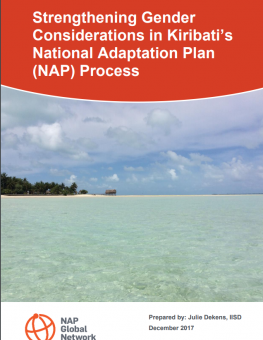
Strengthening Gender Considerations in Kiribati’s National Adaptation Plan (NAP) Process
The purpose of this scoping study is to explore options for strengthening gender considerations in Kiribati’s National Adaptation Plan (NAP) process with a focus on its NAP document, the Joint Implementation Plan on Climate Change and Disaster Risk Management (KJIP), which is expected to be revised in 2018 to reflect the government’s new priorities.
The purpose of this scoping study is to explore options for strengthening gender considerations in Kiribati’s National Adaptation Plan (NAP) process with a focus on its NAP document, the Joint Implementation Plan on Climate Change and Disaster Risk Management (KJIP), which is expected to be revised in 2018 to reflect the government’s new priorities.
To explore options for strengthening gender considerations in the revision of the KJIP, the NAP Global Network collaborated with the Office of the President to hold stakeholder consultations in the capital, South Tarawa, in August 2017. Based on these consultations and a desk review, we found the integration of gender considerations in the KJIP to be a major positive change because the linking of climate adaptation to gender equality is new at the policy and project levels.
Gender equality has only been recently raised as a political issue and gender mainstreaming has mostly occurred in relation to domestic violence. But much more needs to be done to foster better understanding of the linkages between gender equality and climate adaptation among government officials and women’s organizations. Based on lessons learned from this study, recommendations are offered to the government and development agencies interested in improving gender considerations in Kiribati’s NAP process.
Participating experts
You might also be interested in
Reforming Environmentally Harmful Subsidies
This playbook offers a strategic framework for philanthropic organizations to understand, engage, and advance environmentally harmful subsidies reform as a critical avenue for sustainable environmental and economic transformation.
Kigali Shares Lessons on Flood Risk Reduction and Gender Equality With Other Sub-Saharan African Cities
KIGALI, RWANDA—Representatives from 14 organizations and city governments delivering the USD 21 million SUNCASA project will meet in Kigali this week to exchange experiences and insights on advancing nature-based solutions (NbS) for reducing flood and climate risk while improving the lives of women and vulnerable groups.
Challenging Gender Discriminatory Norms, Practices, and Beliefs in Sub-Saharan Africa
SUNCASA held a series of training sessions to support women and other underrepresented groups in overcoming the barriers preventing their access to natural resources and meaningful participation in nature-based solutions governance.
Tree Planting for Climate Resilience in Freetown, Sierra Leone
This assessment presents the economic valuation of tree planting efforts in Freetown, Sierra Leone, including planting costs, added benefits, and avoided costs.